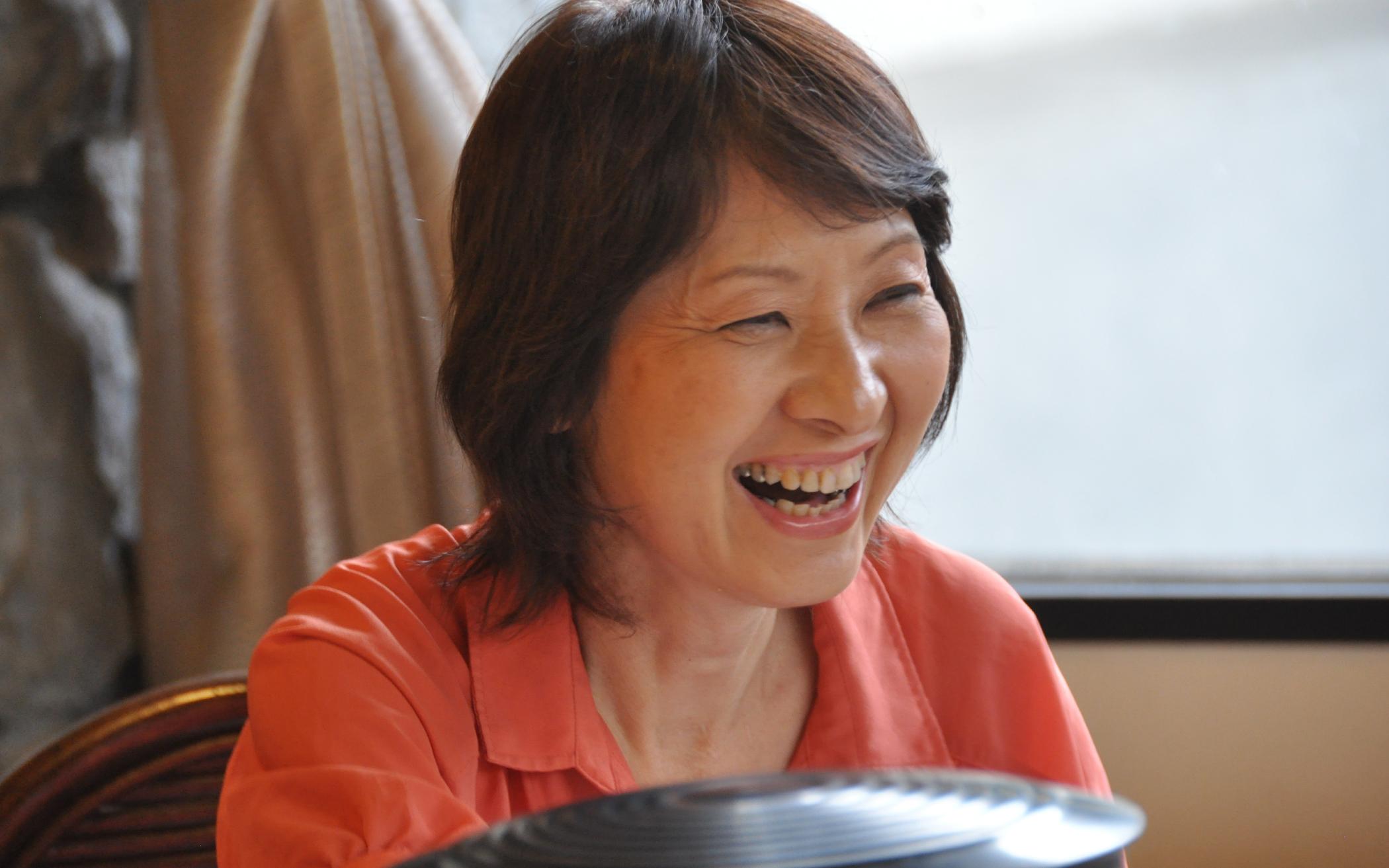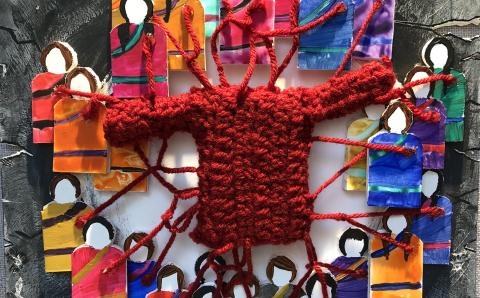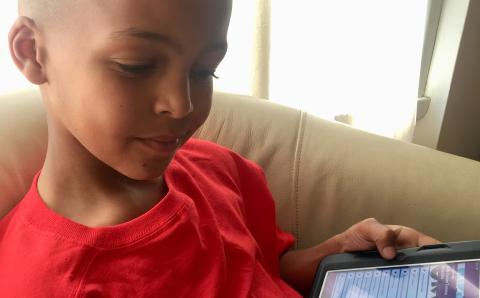When thinking of the persecuted church, you might picture a small gathering in a dark room at night. Christians in North Korea, Afghanistan, or Somalia might jump to the forefront of your mind. And for good reason.
Still, persecution takes many forms and happens in unexpected places. Both Julio and Yuriko know what it means to be persecuted for their faith. And both have experienced how God is using the Christian Reformed Church to draw them into God’s love.
Cultural Pressure in Mexico
Fourteen-year-old Julio’s family lacked a solid religious foundation. They identified as Catholic, but only in name. This changed about three years ago when Julio and his two sisters heard about the Saturday Kids Club held at Jesus El Salvador Church in their hometown of Juarez, Mexico.
The year-round vacation Bible school ministry—led by Blanca Gifford, a missionary with Resonate Global Mission—offers children a home-cooked meal and teaches them about God through Bible lessons, crafts, and other activities.
Julio and his sisters loved it so much they became regular attendees.
Still, Julio wanted to go deeper in his faith.
He began attending worship and Sunday school on his own to learn more about church. As his faith strengthened, he and his sisters began to ask their parents why they didn’t do things like pray before meals or read the Bible at home.
Julio’s parents were pleased and intrigued about the changes they were seeing in their kids.
“Julio’s mom was always grateful for the wonderful program we were providing for the kids in the neighborhood,” Gifford said. “Once in a while she would say to me, ‘I will come to church when I’m ready. I would like to come, but not yet.’”
Still, Mexican culture and society does not always make faith an easy step.
“In Latin America, Roman Catholics tend to lump all Protestant and Evangelical churches with the cults. ‘Sects’ is the word used,” said David Gifford, Blanca’s husband and fellow Resonate missionary. “The persecution here is usually just verbal—mockery. But it can also manifest as not getting a job or a promotion, or in extreme cases, being evicted or rejected by one’s family.”
Julio and his family’s story took a turn when their family’s landlord threatened to evict them if they kept attending Kids Club.
David notes that the United States and Mexico have very different histories. While the U.S. was founded on religious freedom, the Catholic Church had a monopoly for centuries in Latin America.
In the case of Mexico, other churches were not allowed to come in and evangelize until the 1900s. As a result, Mexican culture and society is influenced heavily by a Catholic culture that’s not open to evangelical Christianity.
Despite the threat of eviction, Julio’s parents encouraged their children to keep going to Kids Club. “They had seen so many positive changes in their behavior in different aspects of their lives,” Blanca said.
The family was evicted a month later. Yet they were not left homeless.
“God was so faithful and provided another place for them in the neighborhood,” Blanca said. “Before Christmas last year, we were surprised to see the whole family coming to our Sunday service. Since then, they are all growing in the faith, having devotions at home, sharing the gospel with their friends and extended family members.”
Julio and his family know what it means to be persecuted for their faith—but they have also experienced God’s faithfulness through their trials.
Family and Community Pressure in Japan
While Julio experienced overwhelming support from his family in his new faith, families can also be the reason for hiding one’s faith. In 1991, a Japanese woman named Yuriko said she believed in Jesus. But it took her nearly 26 years to be baptized because of pressure from her family.
“It may sound incredible to Western people that a grown adult needs permission from her parents, but it happens quite often in Japan,” said Masao Yamashita, Japanese language ministry leader for Back to God Ministries International (BTGMI).
Yuriko recognized that her new faith would cause division in her family. Her rural village placed a stigma on Christians, which would affect her whole family. So she tried to hide her relationship with Jesus.
“I kept my faith a secret but my parents found out,” said Yuriko. “My mother was shocked and couldn’t get out of bed. My grandmother thought about sending me to a temple to marry a monk so that I would remain a Buddhist.”
This strong reaction caused Yuriko to end contact with her church, but God found ways to reach her in a part of the world where only 1 percent of people openly profess faith in Christ.
First, Yuriko had a coworker who prayed with her during her lunch break. Then one day, Yuriko turned on her radio. She heard a hymn and that was enough to bring her back to the same station for the next few days. There she heard several of BTGMI’s programs, and she realized that she wasn’t alone in her faith.
“I listened almost every night,” Yuriko said. Soon Yuriko wasn’t just listening, she was engaging with the content, writing the ministry for advice, and even attending some of the in-person events for dispersed believers like her.
Encouraged in her faith, Yuriko began attending church again until a troubling interaction with another congregant made her retreat.
“A woman [from church] kept telling me that I should just leave my parents and that they will be saved when they see my faith,” recalled Yuriko. “I told her that by leaving my parents, people will think of Christianity as a bad religion where people leave their families.”
Despite not regularly attending church, Yuriko continued to deepen her faith, listening to BTGMI programs and attending events and occasional church services. In 2017, Yuriko decided to take a brave step forward in her faith and was baptized.
Yuriko hasn’t disclosed exactly what her relationship with her family is like since her baptism or whether she has even told them. Often, Christians in Japan don’t publicly declare their faith until their parents pass away.
For now, Yuriko continues to go to church occasionally while still engaging with media ministry made possible by the Christian Reformed Church.
“Someone told me that I am like a rootless wanderer, but I’m not. My root is in Jesus,” said Yuriko. “In Japan, people work to spread God’s words through TV, radio, publications, and the Internet.”
“Many people also support such works through prayers and offerings,” Yuriko added. “I’m not saying it isn't necessary to go to church and worship with sisters and brothers in Christ. I hope that one day I will be able to go to church every Sunday and welcome others with joy.”
Praying for the Persecuted Church
Both Julio and Yuriko were able to overcome stigma and embrace their Christian faith because they had a community to support them. For Julio, it was his own family and church. For Yuriko, it was a community of dispersed believers that connected through media.
Please pray for people in these situations, whether they are worshiping in secrecy or have fled their homes for religious freedom. Pray that they will stay rooted in their faith and find community despite persecution.
About the Authors
Brian Clark, ReFrame Ministries








